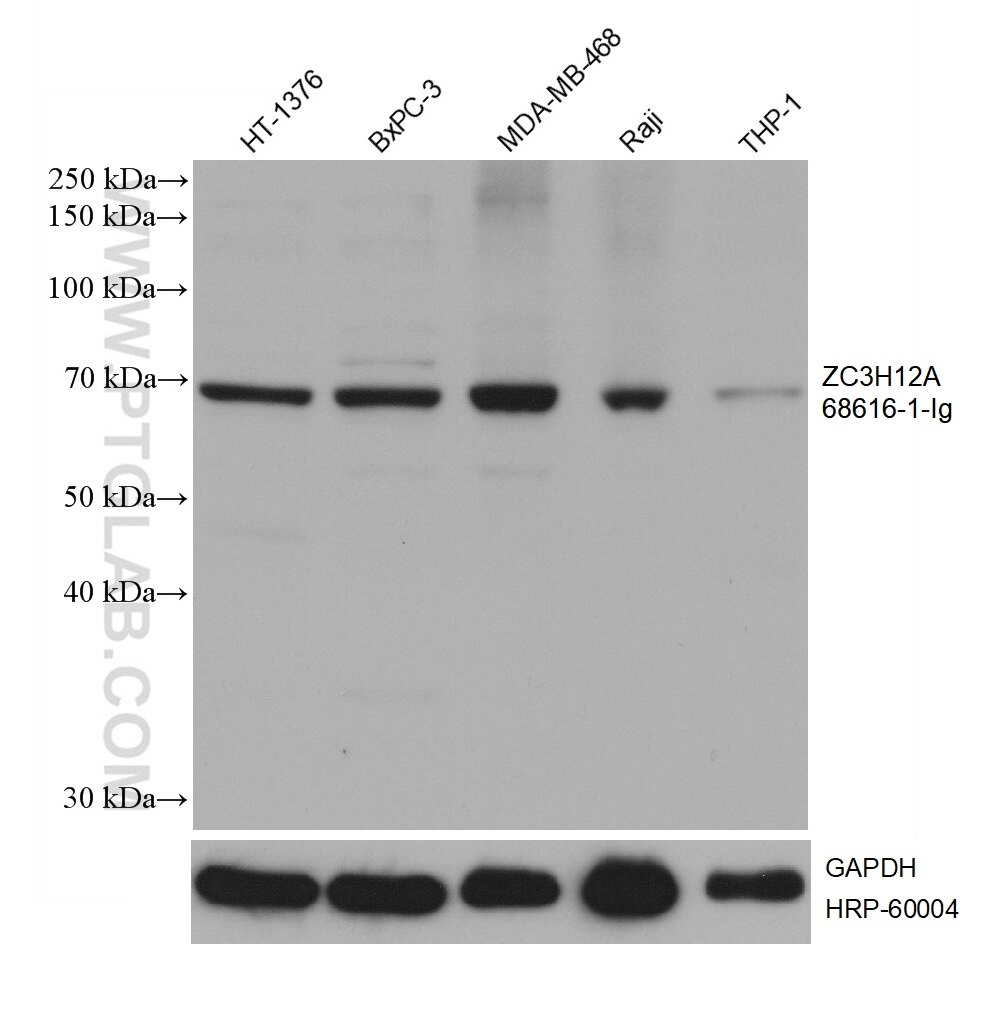Validation Data Gallery
Tested Applications
| Positive WB detected in | HT-1376 cells, BxPC-3 cells, MDA-MB-468 cells, Raji cells, THP-1 cells |
Recommended dilution
| Application | Dilution |
|---|---|
| Western Blot (WB) | WB : 1:5000-1:50000 |
| It is recommended that this reagent should be titrated in each testing system to obtain optimal results. | |
| Sample-dependent, Check data in validation data gallery. | |
Product Information
68616-1-Ig targets ZC3H12A in WB, ELISA applications and shows reactivity with Human samples.
| Tested Reactivity | Human |
| Host / Isotype | Mouse / IgG1 |
| Class | Monoclonal |
| Type | Antibody |
| Immunogen |
CatNo: Ag13877 Product name: Recombinant human ZC3H12A protein Source: e coli.-derived, PGEX-4T Tag: GST Domain: 339-599 aa of BC005001 Sequence: ANALLSPPRAPSKDKNGRRPSPSSQSSSLLTESEQCSLDGKKLGAQASPGSRQEGLTQTYAPSGRSLAPSGGSGSSFGPTDWLPQTLDSLPYVSQDCLDSGIGSLESQMSELWGVRGGGPGEPGPPRAPYTGYSPYGSELPATAAFSAFGRAMGAGHFSVPADYPPAPPAFPPREYWSEPYPLPPPTSVLQEPPVQSPGAGRSPWGRADSLAKEQASVYTKLCGVFPPHLVEAVMGRFPQLLDPQQLAAEILSYKSQHPSE 相同性解析による交差性が予測される生物種 |
| Full Name | zinc finger CCCH-type containing 12A |
| Calculated molecular weight | 599 aa, 66 kDa |
| Observed molecular weight | 66 kDa |
| GenBank accession number | BC005001 |
| Gene Symbol | ZC3H12A |
| Gene ID (NCBI) | 80149 |
| RRID | AB_3085310 |
| Conjugate | Unconjugated |
| Form | |
| Form | Liquid |
| Purification Method | Protein G purification |
| UNIPROT ID | Q5D1E8 |
| Storage Buffer | PBS with 0.02% sodium azide and 50% glycerol{{ptg:BufferTemp}}7.3 |
| Storage Conditions | Store at -20°C. Stable for one year after shipment. Aliquoting is unnecessary for -20oC storage. |
Background Information
ZC3H12A, also named as MCPIP or MCPIP1, is a 599 amino acid protein, which contains one C3H1-type zinc finger and belongs to the ZC3H12 family. ZC3H12A localizes in the cytoplasm and nucleus. Increased expression of ZC3H12A is associated with ischemic heart disease. ZC3H12A has RNase activity and selectively degrades specific target mRNA species and modulates the immune response and inflammation by regulating the decay of specific mRNA molecules.
Protocols
| Product Specific Protocols | |
|---|---|
| WB protocol for ZC3H12A antibody 68616-1-Ig | Download protocol |
| Standard Protocols | |
|---|---|
| Click here to view our Standard Protocols |

